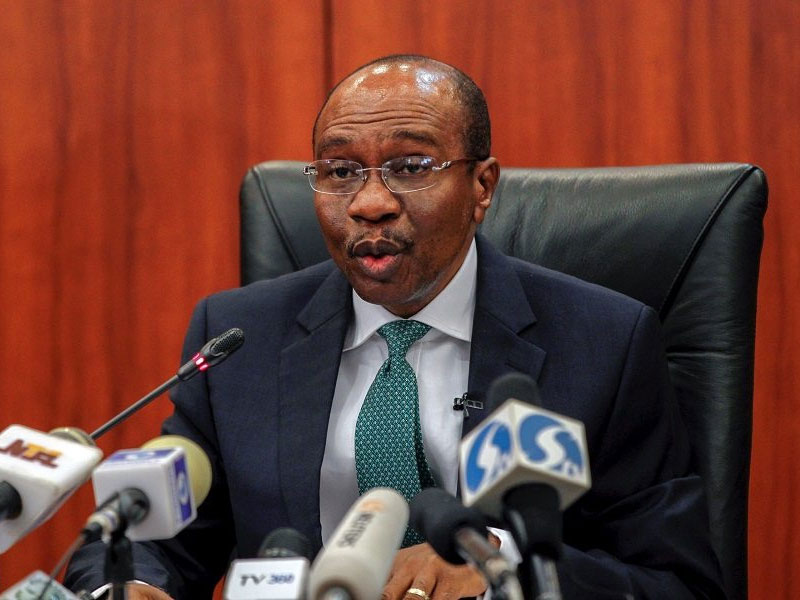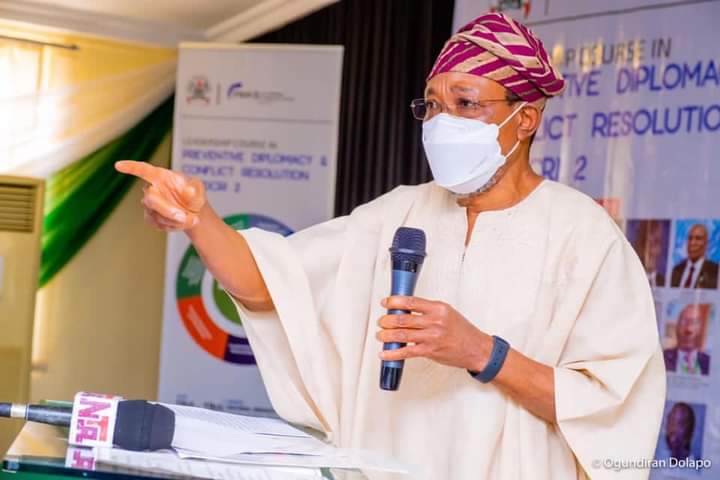The Central Bank of Nigeria (CBN) has advised bank customers to resist arbitrary bank charges illegally imposed on them by Deposit Money Banks (DMBs).
Reacting to claims by Igbo traders that depositors and other account operators with banks in Nigeria were suffering “unbearable” transaction charges.
CBN governor Godwin Emefiele had called on bank customers to arm themselves with the guide to bank charges, read the guide very well and resist any unlawful charges.
Emefiele said: “Go and read your Guide to Bank Charges, you should not allow any bank to just pass on any discretionary charges on your account that is not contained in the guide to bank charges”.
Emefiele urged bank customers to carry the guide as they will carry any holy book. According to him, if you find any bank charges that are not in the guide, raise an alarm. We have our Customer Protection Department, we have always advertised our own hotline d emails where you can always reach us”.
The CBN governor advised bank customers suffering arbitrary bank charges to “tell the bank to reverse the charge because it is not meant to be there”.
A CBN staff in the Corporate Communications Department told The Nation that aggrieved bank customers like the Igbo traders can also approach the banks with their lawyers and accountants to effect a reversal of any illegal bank charges.
Southeast Amalgamated Markets Traders Association (SEAMATA) recently wrote to the CBN to investigate charges from commercial banks.
The CBN’s Guide to Bank Charges required that “details of all fees and charges applicable to a transaction shall be disclosed to the customer at the point of consummation (where applicable) and transaction receipt/alert/confirmation for any charge shall contain a description of the charge”.
For Electronic Funds Transfer the guide states that transfers below N5,000 will attract N10 charge, N5,001 – N50,000 will attract N25 and transactions above N50,000 will attract N50.
Current Account Maintenance Fee (CAMF) is applicable to current accounts ONLY in respect of customer-induced debit transactions to third parties and debit transfers/lodgments to the customer’s account in another bank. The guide states that charges for CAMF is “negotiable subject to a maximum of N1 per mille”.
The guide also specifies penalties for banks that go against the dictates of the guide.
According to the guide, “financial Institutions are to note that any breach of the provisions of this guide carries a penalty of N 2,000,000 per infraction or as may be determined by the CBN from time to time”.
Where a bank is found to have wrongfully imposed a particular charge on its customers, the provision of Section (i) shall apply for the charge on each customer.
Failure to comply with CBN’s directive in respect of any infraction shall attract a further penalty of N2,000,000 daily until the directive is complied with or as may be determined by the CBN from time to time.
Banks are required to log every complaint received from their customers into the Consumer Complaints Management System (CCMS) and must generate a unique reference code for each complaint lodged, which must be given to the customer. Failure to log and provide the code to the customer amounts to a breach and is sanctionable with a penalty of N1,000,000 per breach.
A penalty of N100,000 shall be imposed on a financial institution that contravenes the provisions of Part 6C
The Central Bank of Nigeria (CBN) has advised bank customers to resist arbitrary bank charges illegally imposed on them by Deposit Money Banks (DMBs).
Reacting to claims by Igbo traders that depositors and other account operators with banks in Nigeria were suffering “unbearable” transaction charges.
CBN governor Godwin Emefiele had called on bank customers to arm themselves with the guide to bank charges, read the guide very well and resist any unlawful charges.
Emefiele said: “Go and read your Guide to Bank Charges, you should not allow any bank to just pass on any discretionary charges on your account that is not contained in the guide to bank charges”.
Emefiele urged bank customers to carry the guide as they will carry any holy book. According to him, if you find any bank charges that are not in the guide, raise an alarm. We have our Customer Protection Department, we have always advertised our own hotline d emails where you can always reach us”.
The CBN governor advised bank customers suffering arbitrary bank charges to “tell the bank to reverse the charge because it is not meant to be there”.
A CBN staff in the Corporate Communications Department told The Nation that aggrieved bank customers like the Igbo traders can also approach the banks with their lawyers and accountants to effect a reversal of any illegal bank charges.
Southeast Amalgamated Markets Traders Association (SEAMATA) recently wrote to the CBN to investigate charges from commercial banks.
The CBN’s Guide to Bank Charges required that “details of all fees and charges applicable to a transaction shall be disclosed to the customer at the point of consummation (where applicable) and transaction receipt/alert/confirmation for any charge shall contain a description of the charge”.
For Electronic Funds Transfer the guide states that transfers below N5,000 will attract N10 charge, N5,001 – N50,000 will attract N25 and transactions above N50,000 will attract N50.
Current Account Maintenance Fee (CAMF) is applicable to current accounts ONLY in respect of customer-induced debit transactions to third parties and debit transfers/lodgments to the customer’s account in another bank. The guide states that charges for CAMF is “negotiable subject to a maximum of N1 per mille”.
The guide also specifies penalties for banks that go against the dictates of the guide.
According to the guide, “financial Institutions are to note that any breach of the provisions of this guide carries a penalty of N 2,000,000 per infraction or as may be determined by the CBN from time to time”.
Where a bank is found to have wrongfully imposed a particular charge on its customers, the provision of Section (i) shall apply for the charge on each customer.
Failure to comply with CBN’s directive in respect of any infraction shall attract a further penalty of N2,000,000 daily until the directive is complied with or as may be determined by the CBN from time to time.
Banks are required to log every complaint received from their customers into the Consumer Complaints Management System (CCMS) and must generate a unique reference code for each complaint lodged, which must be given to the customer. Failure to log and provide the code to the customer amounts to a breach and is sanctionable with a penalty of N1,000,000 per breach.
A penalty of N100,000 shall be imposed on a financial institution that contravenes the provisions of Part 6C.
The Nation







